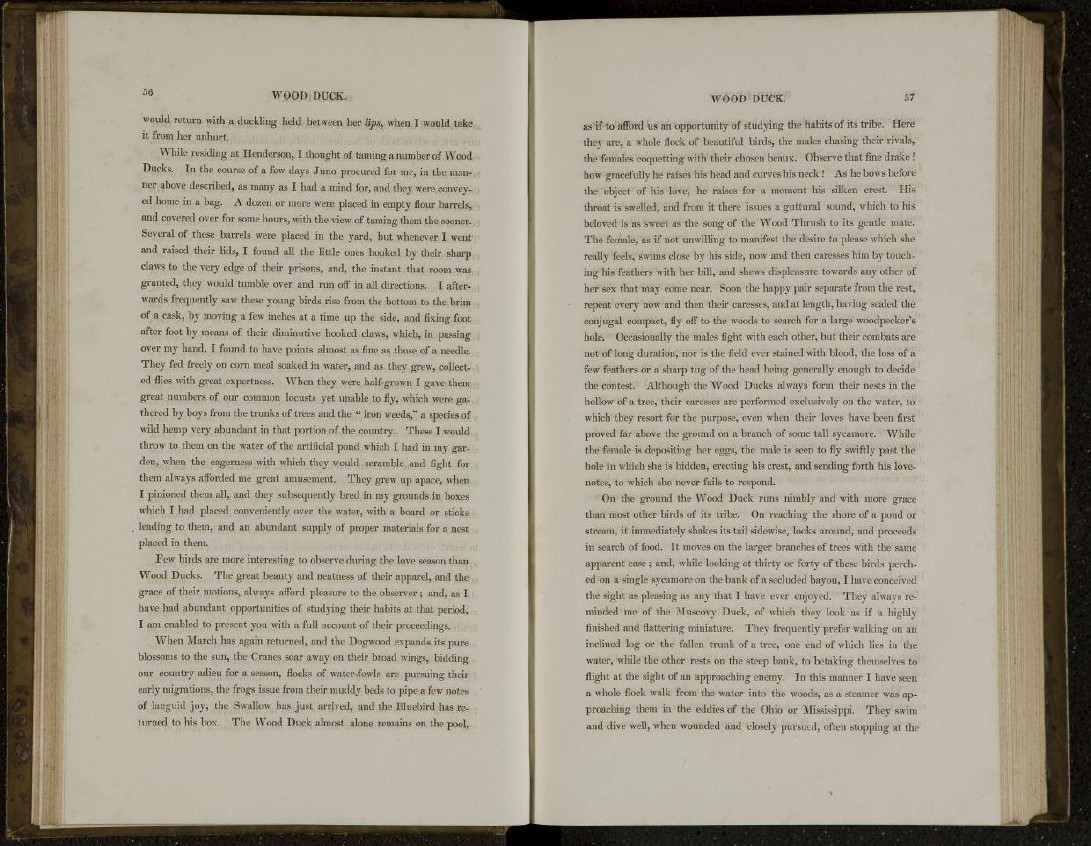
would return with a duckling held between her lips, when I would take
it from her unhurt.
While residing at Henderson, I thought of taming a number of Wood
Ducks. In the course of a few days Juno procured for me, in the manner
above described, as many as I had a mind for, and they were conveyed
home in a bag. A dozen or more were placed in empty flour barrels,
and covered over for some hours, with the view of taming them the sooner.
Several of these barrels were placed in the yard, but whenever I went
and raised their lids, I found all the little ones hooked by their sharp
claws to the very edge of their prisons, and, the instant that room was
granted, they would tumble over and run off in all directions. I afterwards
frequently saw these young birds rise from the bottom to the brim
of a cask, by moving a few inches at a time up the side, and fixing foot
after foot by means of their diminutive hooked claws, which, in passing
over my hand, I found to have points almost as fine as those of a needle.
They fed freely on corn meal soaked in water, and as they grew, collected
flies with great expertness. When they were half-grown I gave them
great numbers of our common locusts yet unable to fly, which were gathered
by boys from the trunks of trees and the " iron weeds," a species of
wild hemp very abundant in that portion of the country. These I would
throw to them on the water of the artificial pond which I had in my garden,
when the eagerness with which they would scramble and fight for
them always afforded me great amusement. They grew up apace, when
I pinioned them all, and they subsequently bred in my grounds in boxes
which I had placed conveniently over the water, with a board or sticks
leading to them, and an abundant supply of proper materials for a nest
placed in them.
Few birds are more interesting to observe during the love season than
Wood Ducks. The great beauty and neatness of their apparel, and the
grace of their motions, always afford pleasure to the observer ; and, as I
have had abundant opportunities of studying their habits at that period,
I am enabled to present you with a full account of their proceedings.
When March has again returned, and the Dogwood expands its pure
blossoms to the sun, the Cranes soar away on their broad wings, bidding
our country adieu for a season, flocks of water-fowls are pursuing their
early migrations, the frogs issue from their muddy beds to pipe a few notes
of languid joy, the Swallow has just arrived, and the Bluebird has returned
to his box. The Wood Duck almost alone remains on the pool,
as if to afford us an opportunity of studying the habits of its tribe. Here
they are, a whole flock of beautiful birds, the males chasing their rivals,
the females coquetting with their chosen beaux. Observe that fine drake !
how gracefully he raises his head and curves his neck ! As he bows before
the object of his love, he raises for a moment his silken crest. His
throat is swelled, and from it there issues a guttural sound, which to his
beloved is as sweet as the song of the Wood Thrush to its gentle mate.
The female, as if not unwilling to manifest the desire to please which she
really feels, swims close by his side, now and then caresses him by touching
his feathers with her bill, and shews displeasure towards any other of
her sex that may come near. Soon the happy pair separate from the rest,
repeat every now and then their caresses, and at length, having sealed the
conjugal compact, fly off to the woods to search for a large woodpecker's
hole. Occasionally the males fight with each other, but their combats are
not of long duration, nor is the field ever stained with blood, the loss of a
few feathers or a sharp tug of the head being generally enough to decide
the contest. Although the Wood Ducks always form their nests in the
hollow of a tree, their caresses are performed exclusively on the water, to
which they resort for the purpose, even when their loves have been first
proved far above the ground on a branch of some tall sycamore. While
the female is depositing her eggs, the male is seen to fly swiftly past the
hole in which she is hidden, erecting his crest, and sending forth his lovenotes,
to which she never fails to respond.
On the ground the Wood Duck runs nimbly and with more grace
than most other birds of its tribe. On reaching the shore of a pond or
stream, it immediately shakes its tail sidewise, looks around, and proceeds
in search of food. It moves on the larger branches of trees with the same
apparent ease ; and, while looking at thirty or forty of these birds perched
on a single sycamore on the bank of a secluded bayou, I have conceived
the sight as pleasing as any that I have ever enjoyed. They always reminded
me of the Muscovy Duck, of which they look as if a highly
finished and flattering miniature. They frequently prefer walking on an
inclined log or the fallen trunk of a tree, one end of which lies in the
water, while the other rests on the steep bank, to betaking themselves to
flight at the sight of an approaching enemy. In this manner I have seen
a whole flock walk from the water into the woods, as a steamer was approaching
them in the eddies of the Ohio or Mississippi. They swim
and dive well, when wounded and closely pursued, often stopping at the